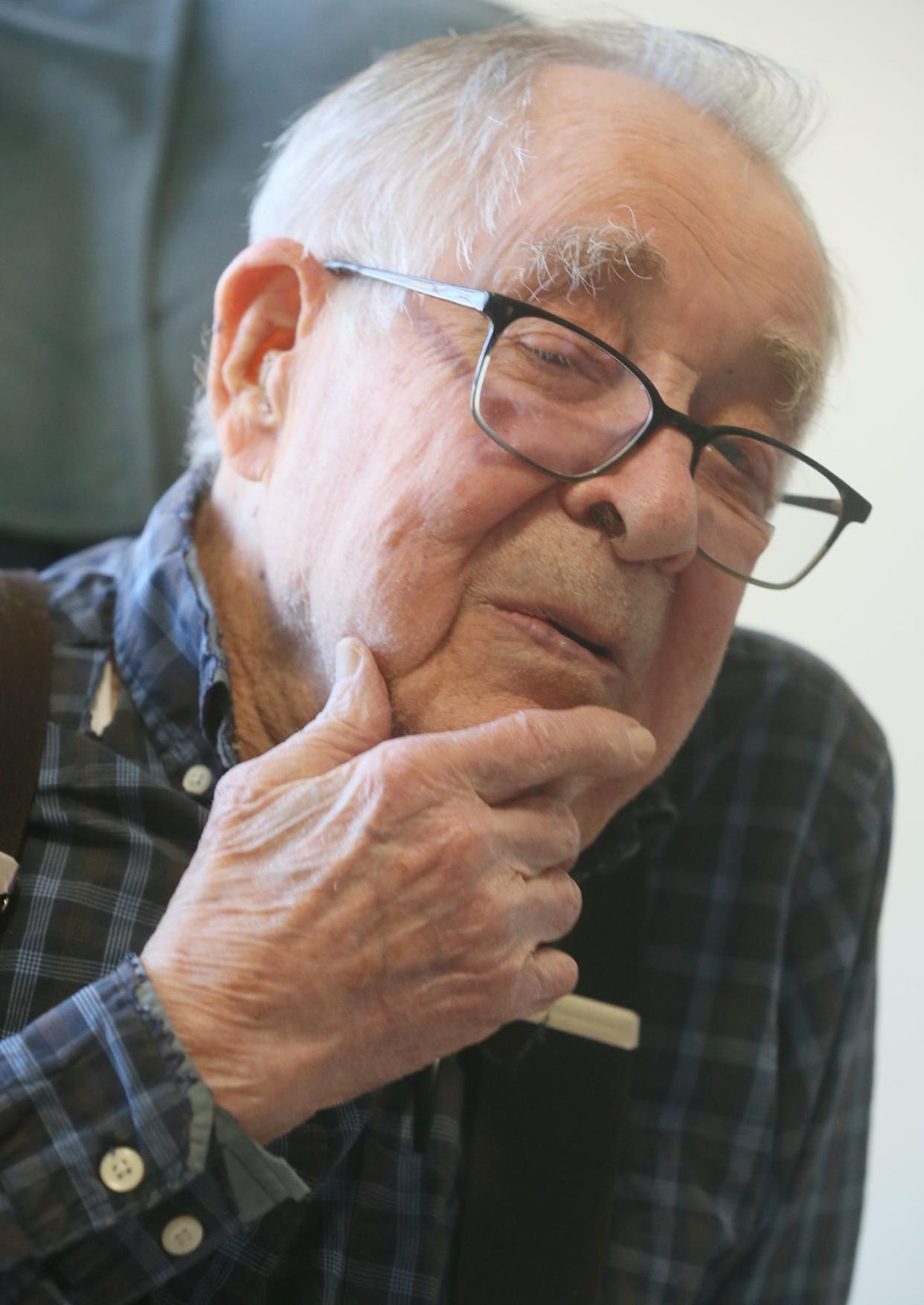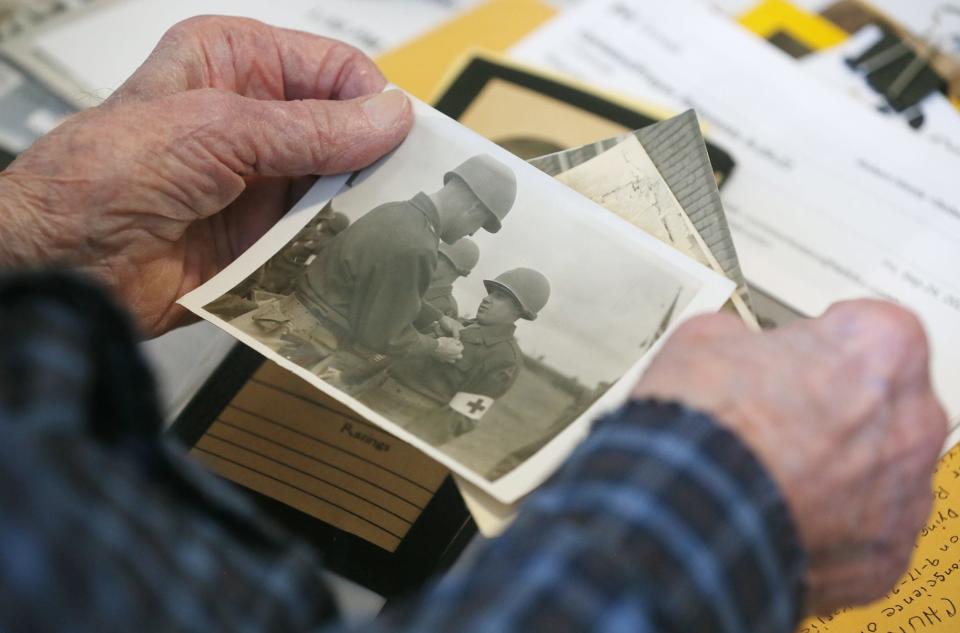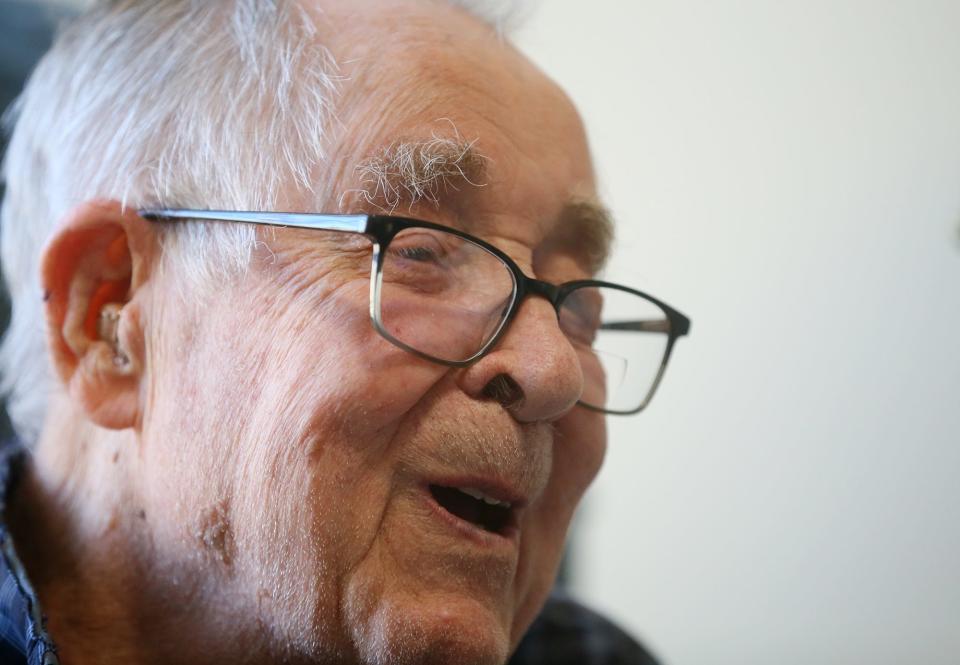‘I did not touch a gun.’ World War II veteran, 100, was a conscientious objector honored for valor

Without firing a single shot, Robert “Bob” Hively served with courage and valor during World War II.
The 100-year-old Army veteran, a resident of Akron, sat down in his Ohio Living Rockynol apartment this month to discuss his unusual but distinguished career in the military.
“I did not touch a gun,” he said.
As a conscientious objector, Hively didn’t believe in killing — and still doesn’t. So instead of taking lives during the war, he helped save them. As a medic, he treated countless wounded soldiers on the battlefields of Europe and earned the Bronze Star, Silver Star and Purple Heart.
Hively was born April 27, 1921, on a farm near Salem. His father, William Leroy Hively, was a postal carrier and his mother, the former Irene Katy J. Miles, was a teacher. He had one brother, Eugene, and three sisters: Beatrice, Genevieve and Mary Lou.
As a boy, Hively attended one-room schools. He graduated from Salem High School in 1939 and continued his studies at Mount Union, where in 1943 he received his Bachelor of Science degree in chemistry.
When did he realize he was a conscientious objector?
“Pretty much from the beginning,” Hively said.
Hively grew up in the Presbyterian church and was the grandson of pacifist Quakers. During Sunday school lessons, the commandment “Thou shalt not kill” from Exodus 20:13 resonated with him.
“To me, that meant you shall not kill another person,” Hively explained. “Jesus’ life was lived in opposition to the use of physical force, and he urged us to follow his example.”
Under the Selective Training and Service Act of 1940, Hively registered for the draft Feb. 16, 1942. Five months later, he received a 1-A classification, meaning he was available for combat. The Mount Union student appealed the decision, explaining before the draft board in March 1943 that he “could not allow himself to be inducted into an organization that could command me to kill other people.”
Hively searched the Bible but found no teaching from Jesus that would justify the taking of lives. He concluded that no war is just.
Battle with draft board
He requested 1-AO classification as a conscientious objector available for noncombatant military service, but the draft board refused. A U.S. marshal arrested him after he did not report for duty.
Appearing in U.S. District Court in Cleveland on Sept. 20, 1943, Hively again explained his religious beliefs. The judge recommended to the draft board that Hively be admitted as a conscientious objector having nothing to do with guns or other arms. As long as Hively enlisted within 20 days, all charges would be dropped.
“I have to give the service credit,” Hively said. “I never had to carry a weapon that would destroy life.”
He trained to be an Army medic near Abilene, Texas. He was on a British ship crossing the Atlantic when the Allied invasion of Normandy began June 6, 1944.
After stops in Liverpool and Southampton, Hively arrived in France about a month after D-Day and joined the 67th Armored Regiment of the 2nd Armored Division.
Hively was present when U.S. forces broke through German lines west of Saint-Lo, France. Thrust into a hellish landscape of artillery explosions and gunfire, the Ohio farm boy initially felt bewildered.
“I was kind of upset and worried about it in the beginning when we first started out,” Hively said. “Something happened. I don’t know what. All of a sudden, my worry just went away. I just felt calm.”
That inner peace served him well. He was part of a four-man team that rode a halftrack on the battlefield, treating wounded soldiers and taking them back to the aid station. Dodging bullets and shrapnel, the team made repeated trips to rescue wounded comrades. The medics often spent entire days out on the field.
Hively’s regiment battled its way through France into Belgium, fought in the Battle of the Bulge, crossed the Rhine into Germany and marched toward Berlin.
Honored for bravery
He earned a Bronze Star for heroic achievement Aug. 21, 1944. According to the citation: “During this action, 2½ miles west of Verneuil, Private Hively volunteered to go forward into the enemy lines to aid the treatment and evacuation of soldiers who had been wounded while on reconnaissance duty in the forward lines. Disregarding his own personal safety, he proceeded unguided and under direct enemy observation, small arms and mortar fire, to terrain held by the enemy. Through his exceptional bravery and devotion to duty the lives of many wounded solders were undoubtedly saved.”
Hively earned a Purple Heart for wounds received Nov. 12, 1944, in an explosion in Germany. He was struck with shrapnel or debris on his left side, but the soft-spoken veteran brushed off the incident as relatively minor.
“It was not a great thing,” he said. “I didn’t lose any time really. I wasn’t taken to the hospital.”
He was back in service in no time, tending to other wounded soldiers.

Hively was awarded a Silver Star for gallantry in action at Rheinhafen Krefeld, a port city on the Lower Rhine. According to the citation:
“On March 4, 1945, Pfc. Hively volunteered to go to the aid of three wounded men. In the face of extremely heavy enemy fire, Pfc. Hively made his way to the men, rendered first aid, and then, although it necessitated three trips through the battle area, he evacuated the wounded to the aid station. It was due to his prompt and courageous action that the lives of three seriously wounded men were saved. The valor and courage displayed by Pfc. Hively reflect great credit upon himself and are in keeping with the highest traditions in the military service.”
Hively recalls when his captain enlisted him for a special mission. The commanding officer had received a call that a German woman required immediate assistance. There were no German doctors available, so the Americans grabbed a medical kit and went to help. The woman was pregnant and had gone into labor.
“So we delivered a German baby,” Hively said.
A toast to end of war
Another happy memory is when he and another soldier sought shelter at war’s end in a parsonage in the German town of Elm. The minister, Hans Ludolph, and his wife, Lisa, graciously took the Americans in for the rest of the time they were in Germany.
“We got ready to ship out,” Hively said. “They had a little party and his wife brought up a bottle that was 5 years old. He said, ‘I didn’t know we had one 5 years old.’ She said, ‘That’s the reason we still have it.’ ”
They toasted the end of the war. The friendly couple stayed in contact with Hively for years, exchanging cards and letters.
Hively’s last assignment was to drive a halftrack, something he had never done before. It was a challenge keeping the halftracks and tanks 25 feet apart in a column traveling 25 mph, especially when gaining speed downhill.
“By the time we got to the top, the front tanks were way down there,” he said. “I remember going about 75 miles an hour in that thing and saw one of the officers out to the side. He just said: ‘Keep your heads down!’ And we went by ’em.”
The soldiers traveled past ruins in the war-scarred country before arriving in Antwerp, where Hively returned to the United States after two years.
Home in Ohio
Returning home to Ohio in the fall of 1945, Hively applied for a job as a chemist at Goodyear Tire & Rubber Co. in Akron and was hired on the spot.
He enjoyed living a peaceful existence.
He met his future wife, Elva Braziell, a Pittsburgh native, on a blind date in Lakeside, Ohio, where she was working at the Victorian hotel at the Lake Erie resort. He went every other weekend to visit her in Pennsylvania. He couldn't bear to be apart from her.
“I felt I was only a half a human,” he said. “I always hated to be lonesome.”
They married Oct. 2, 1948. The couple settled in Cuyahoga Falls, bought a Heslop home on 27th Street and raised two children: William and Jane Hively.
The family joined First Christian Church, which Hively still attends. He worked 47 years at Goodyear before retiring. His wife, Elva, worked as a physical therapist and volunteered for Good Neighbors, where she served as president.
In later life, the couple moved to Rockynol. They were married for 71 years before she died in 2020 at age 94.

Hively maintains his deep faith.
He likes to read science books — he has a bureau drawer packed with them — and enjoys exploring the connection between religion and science. He insists there is a strong connection between the two.
“I think that science explains many things that we call miracles,” he said.
He reads as much as he can, which he said makes him “find out how little I know.”
“Every time you learn something, you find out you know less than you did before,” he said.
Would he still be a conscientious objector today?
“Oh, yes,” he said. “More so than even before.”
He still opposes war. Differences of opinion should be settled by negotiation, not by conflict, he said. Military service reinforced his beliefs and helped him conclude that Jesus’ teachings are correct, he said.
He keeps his medals in a cupboard.
There is another thing occupying his thoughts these days. Hively is participating in a longevity study from Boston University. The centenary study aims to “identify protective profiles associated with exceptional longevity” to unlock the secrets of aging.
“I feel pretty privileged to be 100,” Hively said. “I feel the Lord has something for me to do.”
Mark J. Price can be reached at mprice@thebeaconjournal.com.
This article originally appeared on Akron Beacon Journal: World War II vet, 100, was conscientious objector honored for bravery

